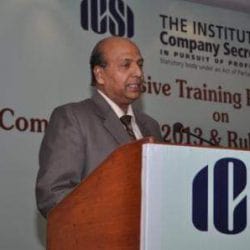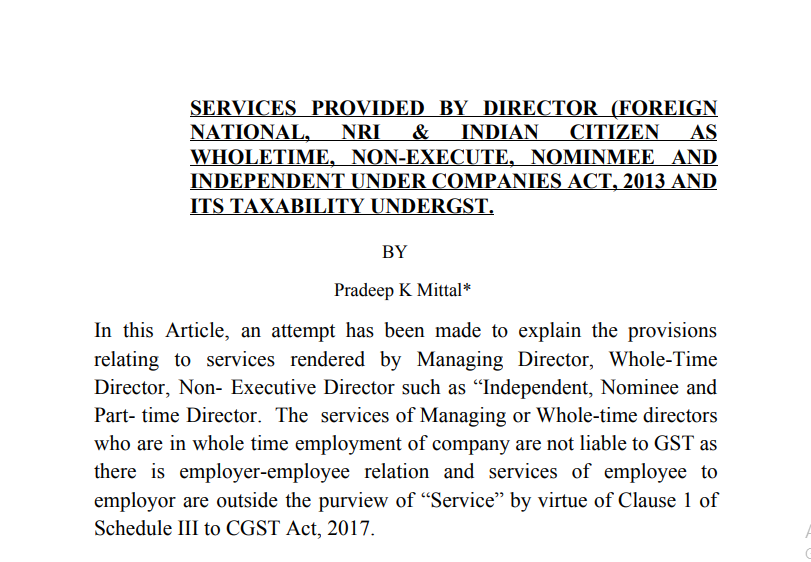Services Provided By Director
Table of Contents
- Services Provided By Director (Foreign National, NRI & Indian Citizen As Wholetime, Non-Execute, Nominee, And Independent Under Companies Act, 2013, And Its Taxability Under GST.
- No GST/Service Tax on Commission Paid To Managing Director.
- Services Provided By Non-Executive Director, Nominee Director, or Independent Director of A Company/Body Corporate.
- Director Having His Place of Business Other Than Location of Regd Office of Company In Which He Is Director.
- Director Who Is Foreign National or NRI
- Read the Copy:
Services Provided By Director (Foreign National, NRI & Indian Citizen As Wholetime, Non-Execute, Nominee, And Independent Under Companies Act, 2013, And Its Taxability Under GST.
In this article, an attempt has been made to explain the provisions relating to services rendered by Managing Director, Whole-Time Director, Non- Executive Director such as “Independent, Nominee, and Part-time Director. The services of Managing or Whole-time directors who are in whole-time employment of the company are not liable to GST as there is employer-employee relation and services of an employee to the employer are outside the purview of “Service” by virtue of Clause 1 of Schedule III to CGST Act, 2017.
2: Thus, salary, allowances, perks, benefits, or any other amount which are in the nature of salary or a part of CTC and payable to either Managing Director or Whole-time Director are not exigible to GST. Furthermore, the Executive Director would also be held to be Whole Time Director by virtue of Section 2(94) of Companies Act, 2013 read with Rule 2(1)(k) of Companies (Specification of Definitions Details) Rules, 2014 and consequently his salary and perks are outside the purview of GST.
2: The Advance Ruling Authority Karnataka in Anil Kumar Agrawal, [2020] (AAR-Kar.), has held that GST is payable on remuneration payable to non-executive director, nominee director, or independent director under reverse charge. In other words, – no GST is payable on salary, allowances, or perks payable to Managing Director, Whole-time Director, or Executive Director.
3: AAA Rajasthan in case of Clay Craft India P. Ltd. In Re(2020) (AAR-Rajasthan) has held that GST is payable by the company under reverse charge on remuneration paid to the whole-time/executive directors also. The ruling was not in accordance with the law and hence, the Government stepped in.
4: Later on, the Government came out with a Clarificatory Circular No.140/10/2020 – GST dated 10.06.2020 to clarify that no GST shall be payable on salary perks, benefits payable to Managing Director or whole-time Director.
5: The Managing Director is appointed under Board Resolution & Shareholder resolution in terms of Section 179, Section 196, and Section 197 of Companies Act, 2013 read with Schedule V, and salary is being paid to him under the authority of a Board Resolution and shareholders’ resolution. Salary and perquisites like house allowance, electricity, and furnishings for the accommodation, leave travel concession, reimbursement of medical expenses for self and family, medical/accident
insurance, club fees, a car with driver, telephone at residence, etc, such remuneration is liable to GST.
6: The Hon’ble Tribunal in Allied Blenders & Distillers P. Ltd. v. CCE (2019) (CESTAT), has held that where the company paid remuneration to its four whole-time Directors for managing the day-to-day affairs of the company and made necessary deductions on account of (i) Provident Fund, (ii) Professional Tax (iii) TDS as an appropriate rate and held out these Directors to all statutory authorities as employees of the company and, therefore, remuneration paid to directors was nothing but salary, and the company was not required to discharge service tax on remuneration paid to Directors. Though the judgment is in respect of service tax, however, the principal shall equally apply to GST as well.
No GST/Service Tax on Commission Paid To Managing Director.
7: As per Section 197(6) of Companies Act,2013, remuneration payable to Whole Time Director could be by way of a monthly payment or a specified percentage of net profits or partly by one way and partly by other. In other words, it is not necessary that only a monthly salary payable would make a person a whole-time employee of the company. It is on record that there are companies that pay remuneration to Directors based on profits, which is sometimes termed as ‘commission’. Really, it is part of his salary on which no GST shall be payable. In McDowell & C V. CIT (2002) 123 Taxman 911 (Mad HC DB), it was held that commission payable to Directors on the turnover basis is’ remuneration’ for purpose of ceiling under Section 40© of Income Tax Act – following Metal Powder C. Vs. CIT (1999) 238 ITR 756 (Mad.) Such remuneration would be in the nature of salary and not liable to GST.
8: In CBE & C circular No. 115/09/2009-ST, dated 31.07.2009, it was clarified that some Companies make payments to Managing Director/Directors (Whole-time) or Independent), terming the same as ‘Commission’. The said amount paid by a company to their Managing Director/Directors (Whole-time or Independent) even if termed as commission, is not the ‘commission’ that is within the scope of business auxiliary service and hence service tax would not be leviable on such
amount.
9: The Tribunal in the case of PCM Cement Concrete Pvt. Ltd. vs. CCE, Siliguri MANU/CK/0096/2017 wherein the Tribunal observed that consideration paid to whole-time directors would be treated as payment of salaries inasmuch as there would be employer-employee relationships and in such cases, there cannot be any levy of service tax. He further relied on the CBEC Circular no. 115/9/2009-ST: MANU/DSTX/0054/2009 dated 31.07.2009, wherein it has been clarified that no service tax is leviable on commission paid to managing directors/whole-time directors, even if the remuneration is termed as ‘commission’, inasmuch as the said managing directors/whole-time directors do not perform consultancy or advisory function.
10: The Tribunal in the case of Maithan Alloys Ltd. vs. CCE and ST, Bolpur (02.11.2018 – CESTAT – Kolkata): MANU/CK/0094/2018 has held if the payments are in the nature of salary and is subject to TDS under Section 192 Income Tax, no GST shall be payable on such payment.
Services Provided By Non-Executive Director, Nominee Director, or Independent Director of A Company/Body Corporate.
11: The Non-Executive Directors do not take part in the day to day activities of the company. They only attend the meetings of the Board of Directors or its Committees and thus, work only at periodic intervals on a part-time basis. Section 166 of the Companies Act, 2013 makes provision for duties of Directors. Generally, they are informed about the day to day progress by way of MIS/Periodic Reports. However, the Companies Act, 2013, does not make any distinction between executive and non- executive directors even in respect of liabilities as a Director.
12: Thus, sitting fees, commission on net profit, and other payments made to non-whole time directors, independent directors, or nominee directors of a Company or a Body Corporate are, however, subject to GST. The obvious question is under which Tariff Head. The services provided by a Director of the company would, in my view, fall under residual Tariff Head i.e. 999799. It needs no elaboration that such remuneration in the form of sitting fee, commission on net profit to non-executive director, guarantee commission, or any payments which are given to a Director in the discharge of his duties, functions, and responsible as a Director of a Company, is also liable to GST under Reverse Charge Basis by virtue of Notification No.13/2017-CT (Rate) and 10/2017-IT (Rate) both dated 28.06.2017 effective from 01.07.2017.
Director Having His Place of Business Other Than Location of Regd Office of Company In Which He Is Director.
13: If Director providing service is from out of state, a question arises as to whether IGST be paid or CGST and SGST/UTGST should be paid under RCM? There appears to be no consensus and views are divided and hence, the appropriate course would be to pay CGST and SGST/UTGST under reverse charge. If the Director is from out of India, it will be the import of service and IGST should be payable.
Director Who Is Foreign National or NRI
14: As per Section 2(34) of Companies Act, 2013, Director mean a Director appointed to the Board of a Company and whereas as per Section 2(13) of Companies Act, 1956, “Director” mean a Director appointed to the Board of a company, and includes a deemed Director – the word “deemed director” has been excluded under the Companies Act, 2013.
15: The Foreign National or NRI can be appointed as Managing Director or Whole Time Director in accordance with the provisions of Schedule V to the Companies Act, 2013. All Directors need not be residents of India and need not have a local address in India.
16: During the pre-GST regime, Service Tax was leviable on the sitting fee paid to the Directors who are not performing routine functions but only provide advice/consultation to the management while attending the meeting of the Board of Directors of a company as has been held by Allahabad High Court in the case of Meekin Transmission Ltd. MANU/UP/0661/2008 (ALL). It may be seen that no case has been made out by the Department that such remuneration, other than the salary paid to him, was not for the routine work he performs as Managing Director, but was for the consultation he provides. Therefore, the case is squarely covered by the exclusion contained under Section 65(44)(b) of
Finance Act, 1994 as has been held in NRB Industrial Bearings (P) Ltd CCE MANU/CM/0267/2019.
17: In Rentworks India Pvt.Ltd. v. CCE (2016) 43 STR 634 = 2016- TIOL-1199 (CESTAT), the Foreign Director was providing marketing consultancy services to the company. Company contended that it was salary to the foreign director and the Income Tax department was treating this amount as salary. It was held by Tribunal that if an amount paid to an individual was treated as salary by the income tax department, it could not be held by the service tax department as the amount paid for consultancy charges and service tax demanded on the same.
Read the Copy:
 Advocate Pradeep Kumar
Advocate Pradeep Kumar
PK Mittal BCom Delhi university 1975 LLB Delhi University 1978 FCS Fellow Member of ICSI 1992 1982 to 1992 as CS in Corporate Head Legal Apollo Tyres Ltd 1986 to 1992 1993 onwards Advocate in Delhi High Court CESTAT NCLT = Practcising Indirect Tax and Corporate laws 1993 to till date. Written more than 100 Article on Company Law and Corporate laws Indirect Tax Speaker on Indirect Tax Co Law and IBC in various Seminars Workshop organised by ICAI ICSI and ICMA and other organisations Convenor Core Group on GST of ICSI








